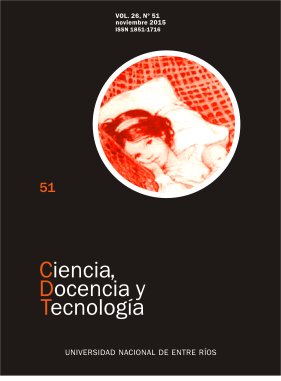Abstract
The aim of this paper is a theoretical and methodological reflection on the emergence and development of links between the university and its environment. We discuss the implications of studying this link focusing on the constitution of social problems and social networks.
References
BLUMER, H. (1971). Social Problems as Collective Behavior, en: Social Problems, 18(3):298-306.
BUSCHINI, J. y Di BELLO, M. (2013). Emergencia y consolidación de las políticas de vinculación entre el sector científico- académico y el sector productivo en la Argentina: el rol de los expertos, en: XIV Jornadas Interescuelas de Historia, Mendoza, 28-30 de octubre de 2013.
CALLON, M. (1986). Some Elements of a Sociology of Translation: Domestication of the Scallops and the Fishermen of St Brieuc Bay, en: LAW, J. (editor): Power, Action and Belief: A New Sociology of Knowledge. London: Routledge y Keagan Paul.
CLARKE, A. y STAR, S. (2008). The Social Worlds Framework: A Theory-Method Package. En: HACKET et al. (eds), The handbook of science and technology studies. Cambridge, Massachusetts/London: the MIT Press.
CLARKE, A y FUJIMURA, J. (1992). Introduction: What tools? Which Jobs? Why right? En: CLARKE, A.; FUJIMURA, J. (eds), The Right Tools for the Job: At Work in Twentieth Century Life Sciences. Princeton: Princeton University Press.
DAGNINO, A.; THOMAS, H. (2000). Elementos para una renovación explicativa-normativa de las políticas de innovación latinoamericanas, en: Revista Espacios digital, 21(2).
ETZCOWITZ H. y WEBSTER, A. (eds.) (1998). Capitalizing Knowledge. New intersections of industry and academia. Albany: State University of New York Press, SUNY Series Frontiers in Education.
GEIGER, R. (2011). Conocimiento y dinero, China, Fundación Universidad de Palermo. En: GIBBONS, M. et al. (1994). The New Production of Knowledge: The Dynamics of Science and Research in Contemporary Societies. London: Sage.
GIDDENS, A. (1984) [1995]. La Constitución de la sociedad. Bases para la teoría de la estructuración. Buenos Aires: Amorrortu.
GROSSETTI, M. (2007). Reflexiones en torno a la noción de red, en: REDES, 13 (25), Bernal: Editorial UNQ.
HILGARTNER, S. y BOSK, CL. (1988). The Rise and Fall of Social Problems: A Public Arenas Model, en: American Journal of Sociology, 94(1):53-78.
HURTADO DE MENDOZA, D. (2010). La ciencia argentina. Un proyecto inconcluso 1930 – 2000. Buenos Aires: Edhasa.
HURTADO DE MENDOZA, D. ; MALLO, E. (2012). Riesgos teóricos y agendas de políticas: el “mal del modelo lineal” y las instituciones de CyT como cajas negras. En: THOMAS, H.; et al. (2007). Evaluando la evaluación. Políticas universitarias, instituciones y actores en Argentina y América Latina. Buenos Aires: Prometeo.
LAHIRE, B. (2006). El espíritu sociológico. Buenos Aires: Ediciones Manantial.
LLOMOVATTE, S. (ed.) (2006). La vinculación Universidad-empresa (miradas críticas). Buenos Aires: Miño.
LUNDVALL, B. (ed.) (1992). National System of Innovation. Towards a Theory of Innovation and Interactive Learning. Londres: Pinter Publishers.
MITCHELL, J. C. (ed.) (1969). Social networks in urban situations. Manchester: University Press.
PESTRE, D. (2003) [2005]. Ciencia, dinero y política. Buenos Aires: Nueva Visión.
PRATI, M. (2011). De cómo hacer política universitaria en la Argentina: enseñanzas a partir de la implementación del Programa de Incentivos. Tesis de doctorado, Facultad Latinoamericana de Ciencias Sociales (FLACSO), Sede Buenos Aires.
RIQUELME, G. (editora) (2008). Las universidades frente a las demandas sociales y productivas (tomos I y II). Buenos Aires: Editorial Miño y Dávila.
SLAUGHTER, S. y LARRY, L. (1997). Academic Capitalism: Politics, Policies, and the Entrepreneurial University. Baltimore: J.Hopkins University.
SHINN, T. (2002), La nueva producción de conocimiento y la 'Triple Hélice', en: REDES, IX (18):191-232.
STAR, S. y GRIESEMER, J., (1989). Institutional Ecology, ´Translations´ and Boundary Objects: Amateurs and Professionals in Berkeley´s Museum of Vertebrate Zoology, 1907-39, en: Social Studies of Science, 19:387-420. Reeditado en: BIAGIOLI, M (ed), (1999). The Science Studies Reader. New York: Routledge, 505-24.
VACCAREZZA, L. (1997). Las políticas de vinculación Universidad-Empresa en el contexto de América Latina, en: Revista Espacios digital, 18(1):23-37.
VACCAREZZA, L.; ZABALA, J.P. (2002). La construcción de la utilidad social de la ciencia. Investigadores en biotecnología frente al mercado. Buenos Aires: Universidad Nacional de Quilmes.
VASEN, F. (2012). La construcción de una política científica institucional en la Universidad de Buenos Aires (1986-1994). Tesis de doctorado, inédita. Buenos Aires: Universidad Nacional de Quilmes.
VERSINO, M. (2007). Los discursos sobre la(s) política(s) científica y tecnológica en la Argentina democrática: O acerca del difícil arte de innovar en el “campo” de las políticas para la innovación (pp 335-366). En: CAMOU, A. et al. (Coords) La Argentina Democrática: Los Años y Los Libros. Buenos Aires: Prometeo
VERSINO, M.; GUIDO, L.; DI BELLO, M. (2012). Universidades y Sociedades. Aproximaciones al análisis de la vinculación de la universidad argentina con los sectores productivos. Buenos Aires: Universidad Nacional de General Sarmiento, IEC-CONADU.
VESSURI, H. (comp.) (1995). La Academia va al Mercado. Relaciones de científicos académicos con clientes externos. Venezuela Caracas: Fondo Editorial FINTEC.
ZIMAN, J. (1996). Postacademic Science: Constructing Knowledge with Networks and Norms”, en: Science Studies, 9(1):67-80.
The authors retain the copyright and grant the journal the right to be the first publication of the work, as well as licensing it under a Creative Commons Attribution License that allows others to share the work with an acknowledgment of the authorship of the work and publication initial in this magazine. All content is published under the Creative Commons 4.0 international license: Attribution-Non-Commercial-Share Alike.

